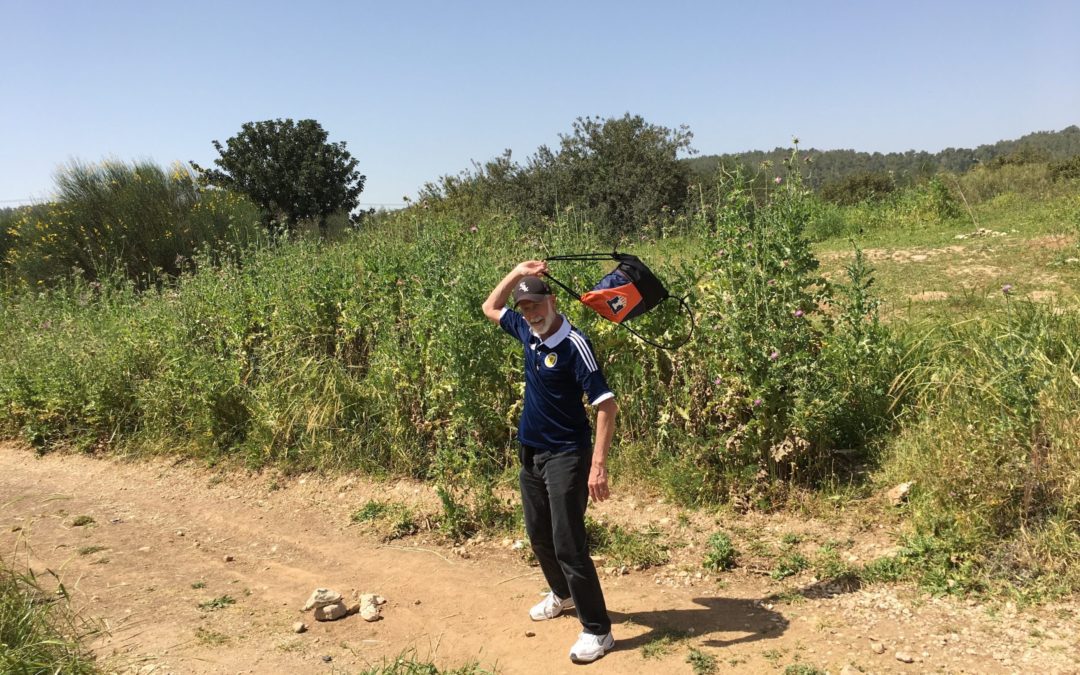
Okay, so I’m not slinging an authentic ancient Israelite sling. But I’m giving it the old college try in the Valley of Elah, where David battled Goliath.
The life of a giant is no piece of cake.
I recently listened to a book about the making of the classic movie, The Princess Bride, which featured a humongous actor known as André the Giant. André was a gentle giant, according to the book’s writer, Cary Elwes, who played a lead role in the movie. André stood 7 feet, 4 inches tall, and weighed 520 pounds. But all of that bulk left him with an aching back. Imagine how your body would feel if you carried an extra 300 pounds around with you every day.
It was difficult for Andre to fit into many vehicles, and they couldn’t find a horse that could carry him in the movie. Everywhere he went, people stared. When children saw him, they would either run toward him in delight or flee in terror, screaming.
But André took it all in good stride until he died in 1993 at age 46. (Giants also often live shorter lives.)
The tallest man in recorded history was Robert Pershing Wadlow from Alton, Illinois, who soared to the height of 8 feet, 11.1 inches. He weighed 490 pounds, but in photos he looks quite thin because the weight was spread across an enormous frame. He died especially young—at age 22 due to an infection.
Many giants, including André, suffer from acromegaly, a disorder that creates excessive growth hormones. Some have even theorized that Goliath of Biblical fame suffered from acromegaly. In his book, David and Goliath, Malcolm Gladwell wonders if Goliath might have had vision problems due to this disorder. Why else, he asks, did Goliath talk about David coming at him with “sticks†(plural) when David carried one shepherd’s staff?
But who knows for sure?
One of my favorite stops in Israel was the Valley of Elah, the lush land west of Jerusalem, where David did battle with Goliath. We found a dry streambed running through the field, where tourists (myself included) routinely pick up five smooth stones—just as David did when he was looking for rocks to sling at the giant. Our tour guide told us the stones were probably trucked over to keep replenishing the streambed, so who knows where these rocks really came from. But I still keep them on my bookshelf because, after all, I had gathered them from the Valley of Elah and that’s good enough for me.

The Philistines and the Israelites squared off in the Valley of Elah, west of Jerusalem. People are walking through a dry riverbed, where David may have found his five smooth stones to fight Goliath.
In David and Goliath, Gladwell quotes Eitan Hirsch, a ballistics expert with the Israeli Defense Forces who calculated that a slinger could hurl a rock with a speed almost equal to a bullet from a gun. That’s why ancient armies had entire units of “projectile warriors,†who fired arrows and slung stones.
So David’s sling was a more fearsome weapon than we often give it credit. What’s more, David had the advantage of being fast and nimble because he wasn’t weighted down with armor. (He wisely turned down Saul’s offer to loan him his armor.) Goliath, in contrast, was like a lumbering tank, wearing roughly 100 pounds of armor.
The only vulnerable spot on Goliath’s body was his forehead, which was unprotected. Any slinger worth his salt was highly accurate, so it’s no surprise that David was able to strike him in the forehead, and that Goliath died on the spot. Stones were so deadly that the Romans had a special tool designed solely for pulling rocks from the bodies of injured soldiers.
These are all good reasons why Goliath was defeated by a younger, smaller opponent. But there were two even better reasons—reasons of the heart.
The first: Based on Goliath’s taunting, he was probably suffering from a severe case of pride. “Am I a dog, that you come at me with sticks?†he teased the young David. Goliath was quite the trash talker, and after striking fear into the entire Israelite army, his head must’ve gotten quite big, and he became overconfident. Little did he know he was going to soon lose that head.
As Proverbs 16:18-19 says, “Pride goes before destruction, a haughty spirit before a fall. Better to be lowly in spirit along with the oppressed than to share plunder with the proud.â€
But most importantly, Goliath had another, even greater heart problem. He lacked the Lord.
David, who could do a bit of trash talking himself, shouted, “You come against me with sword and spear and javelin, but I come against you in the name of the Lord Almighty, the God of the armies of Israel, whom you have defied.â€
Notice the difference in their taunts. For Goliath, it was all about him. The Israelites had insulted him because they sent a boy “with sticks†to battle him. For David, it was all about God. David wasn’t upset that Goliath insulted him. He was upset that Goliath had insulted God.
David had both humility and the Lord on his side. And it didn’t hurt that he could sling stones with the best of them.
Looking at it that way, Goliath really didn’t stand a chance.
By Doug Peterson
